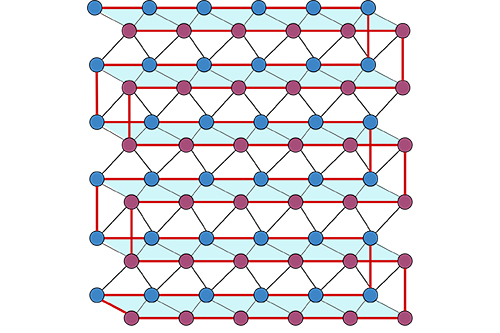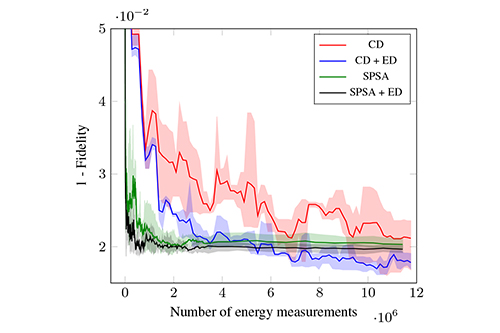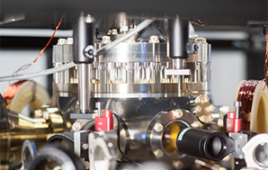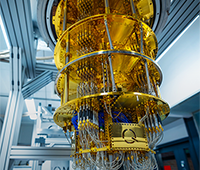
Layout of qubits in Google’s Sycamore architecture
Researchers from the University of Bristol and quantum start-up, Phasecraft, have advanced quantum computing research, bringing practical hybrid quantum-classical computing one step closer.
The team, led by Bristol researcher and Phasecraft co-founder, Dr. Ashley Montanaro, has discovered algorithms and analysis which significantly lessen the quantum hardware capability needed to solve problems which go beyond the realm of classical computing, even supercomputers.
In the paper, published in Physical Review B, the team demonstrates how optimized quantum algorithms can solve instances of the notorious Fermi-Hubbard model on near-term hardware.
The Fermi-Hubbard model is of fundamental importance in condensed-matter physics as a model for strongly correlated materials and a route to understanding high-temperature superconductivity.
Finding the ground state of the Fermi-Hubbard model has been predicted to be one of the first applications of near-term quantum computers and one that offers a pathway to understanding and developing novel materials.
“Quantum computing has critically important applications in materials science and other domains. Despite the major quantum hardware advances recently, we may still be several years from having the right software and hardware to solve meaningful problems with quantum computing. Our research focuses on algorithms and software optimizations to maximize the quantum hardware’s capacity, and bring quantum computing closer to reality, said Dr. Ashley Montanaro, research lead and co-founder of Phasecraft.
“Near-term quantum hardware will have limited device and computation size. Phasecraft applied new theoretical ideas and numerical experiments to put together a very comprehensive study on different strategies for solving the Fermi-Hubbard model, zeroing in on strategies that are most likely to have the best results and impact in the near future.”

Performance of variational algorithms in a noisy simulation.
“The results suggest that optimizing over quantum circuits with a gate depth substantially less than a thousand could be sufficient to solve instances of the Fermi-Hubbard model beyond the capacity of current supercomputers. This new research shows significant promise for producing the ground state of the model on near-term quantum devices, improving on previous research findings by around a factor of 10,” said Lana Mineh, a PhD student in the School of Mathematics and the Centre for Doctoral Training in Quantum Engineering, who played a key role in the research.
Physical Review B, published by the American Physical Society, is the top specialist journal in condensed-matter physics. The peer-reviewed research paper was also chosen as the Editors’ Suggestion and to appear in Physics magazine.
“The Fermi-Hubbard model is a major challenge in condensed-matter physics, and the Phasecraft team has made impressive steps in showing how quantum computers could solve it. Their work suggests that surprisingly low-depth circuits could provide useful information about this model, making it more accessible to realistic quantum hardware,” said Andrew Childs, professor in the Department of Computer Science and Institute for Advanced Computer Studies at the University of Maryland.
“Sooner or later, quantum computing is coming. Developing the algorithms and technology to power the first commercial applications of early quantum computing hardware is the toughest challenge facing the field, which few are willing to take on. We are proud to be partners with Phasecraft, a team that are developing advances in quantum software that could shorten that timeframe by years,” said Hartmut Neven, head of Quantum Artificial Intelligence Lab, Google.
“At Phasecraft, our team of leading quantum theorists have been researching and applying quantum theory for decades, leading some of the top global academic teams and research in the field. Today, Ashley and his team have demonstrated ways to get closer to achieving new possibilities that exist just beyond today’s technological bounds,” said Phasecraft Co-founder Dr. Toby Cubitt.
Phasecraft has closed a record seed round for a quantum company in the UK with £3.7 mil ($4.9 mil) in funding from private-sector VC investors, led by LocalGlobe with Episode1 along with previous investors. Former Songkick founder Ian Hogarth has also joined as board chair for Phasecraft. Phasecraft previously raised £750,000 ($991,408) pre-seed round led by UCL Technology Fund with Parkwalk Advisors and London Co-investment Fund and has earned several grants facilitated by InnovateUK. Between equity funding and research grants, Phasecraft has raised more than £5.5 mil ($7.3 mil).
“With new funding and support, we are able to continue our pioneering research and industry collaborations to develop the quantum computing industry and find useful applications faster,” said Dr. Toby Cubitt.
Paper:
‘Strategies for solving the Fermi-Hubbard model on near-term quantum computers,’ by Cade, C., Mineh, L., Montanaro, A. and Stanisic, S. in Physical Review B: journals.aps.org/prb/abstract/10.1103/PhysRevB.102.235122




Tell Us What You Think!